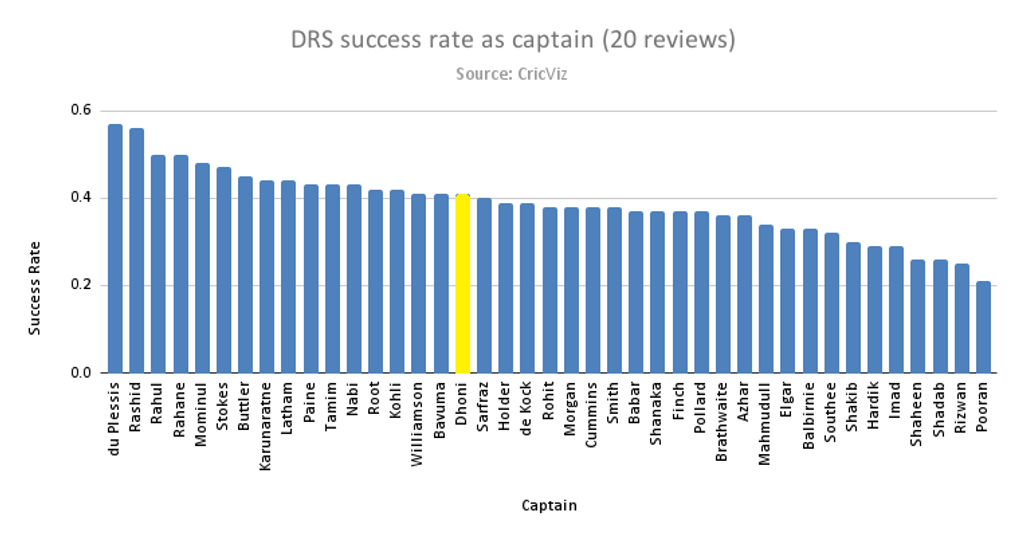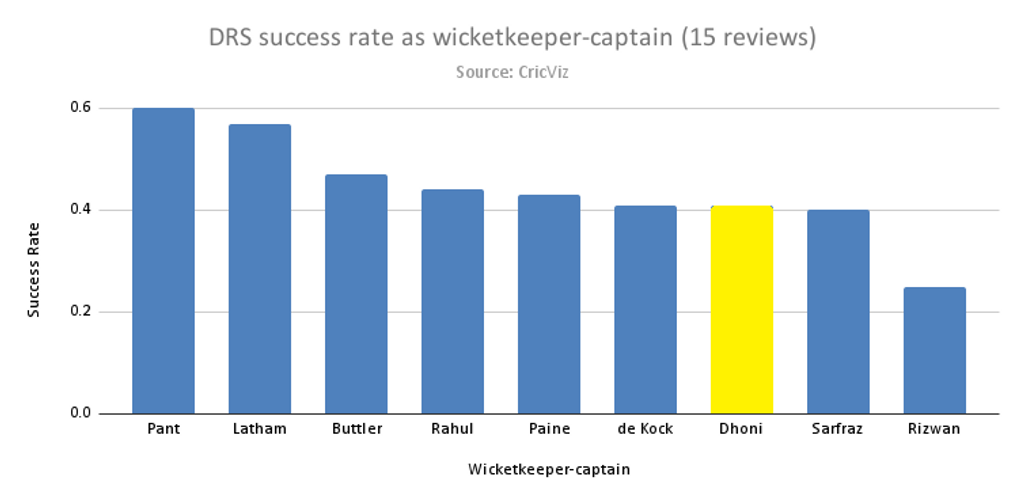
When it comes to opting for the Decision Review System, MS Dhoni’s accuracy has assumed mythical proportions… but is there any evidence that the ‘Dhoni Review System’ is better than any other? Abhishek Mukherjee investigates.
Yashasvi Jaiswal and Jos Buttler had raced away to their characteristic start that day at the Sawai Mansingh Stadium, and Rajasthan Royals were 42-0 after three overs.
Dhoni replaced Tushar Deshpande with Maheesh Theekshana. Buttler got a single off the first ball, and the second brushed Jaiswal’s pad.
Jaiswal tried to sweep the third ball and missed. The ball hit him on the pad again, and this time the Chennai Super Kings fielders appealed. Not out, was the verdict, and MS Dhoni reviewed.
Replays revealed that the ball had pitched outside leg. “For once, MS Dhoni got the review wrong,” quipped Sunil Gavaskar on air, as Theekshana prepared to resume.
Gavaskar was not the first to make the claim that Dhoni has a special gift with the fabled ‘T’ sign, though he is certainly among the most eminent. Over the years, Dhoni has become synonymous to successful DRS calls… to the extent that the acronym is often fondly expanded to the Dhoni Review System.
To evaluate the claim, we looked at every match for which information on DRS is available on the CricViz database. India were late to embrace DRS, and when they finally did, it almost coincided with Dhoni’s resignation as India limited-overs captain (he had retired from Test cricket before).
The data on India captains is, thus, not large enough to come to a conclusion, and formats had to be combined. Since the Laws of Cricket and Playing Conditions related to dismissals are not format-specific, considering cross-format DRS success rates is more logical than doing so for, say, maiden overs.
The database includes 112 captains who have reviewed at least once – one must remember here that even in 2023, DRS is not used in every recorded match – with an overall success rate of 40 percent.
Of these 112, only 41 have used the DRS 20 times or more. They have a near-identical success rate, so this does not seem to be something you can improve with ‘match practice’.
Babar Azam leads the way with 172 calls, and Joe Root (162), Virat Kohli (144), Dimuth Karunaratne (124), and Kane Williamson – this is across formats, remember – complete the top five.
With 57 per cent, Faf du Plessis has the most accurate record among captains, while Nicholas Pooran (21) is at the other end of the spectrum. If we drop the cut-off to 10 calls, Dinesh Chandimal and Aiden Markram score 63 percent, while at 14 percent, Wahab Riaz fares the poorest.
Dhoni’s career as captain in a match with DRS record has been mostly restricted to the IPL. Of his 22 calls, he has got nine correct, which gives him a rate of 41 percent – basically exactly average.
The names above him include Faf du Plessis and KL Rahul, two other captains at the 2023 IPL; Ben Stokes, Dhoni’s Chennai teammate; and Ajinkya Rahane and Virat Kohli, former India captains. Significant names below Dhoni include Babar, Rohit Sharma, and Hardik Pandya.

Wicketkeepers enjoy a unique vantage position, and are therefore often said to be the best-equipped to take the calls. Dhoni’s ‘referral career’ has been entirely behind the stumps… so where does he rank among wicketkeeper-captains?
We now have 21 captains, and the success rate is slightly higher than before (42 percent). If we restrict ourselves to the nine captains with 15 calls, the percentage reads 43 – again an indication that the rate has little to do with practice.
Rishabh Pant (60 percent – the most among anyone with four or more referrals) and Mohammad Rizwan (25) are at the opposite ends of the spectrum.
At 41 – we have come across this number before – Dhoni is above only the two Pakistanis, Sarfaraz Ahmed and Rizwan, whose count is low enough to be labelled as an outlier on the list.
Rahul makes curious, even counterintuitive, reading. As wicketkeeper-captain, he has got seven out of 16 calls correct, while as an outfielder, that count stands at 18 out 34.
Dhoni also kept wicket for India while Virat Kohli led them. Of the seven entries on the database, Dhoni had a 4-3 (57 percent) success rate. While this is higher than his 41 percent as captain, it is really a small sample – and there are other combinations with better records.
Quinton de Kock, for example, has a 4-1 (80) record with Rahul as captain; Rahmanullah Gurbaz 7-3 (70) with Rashid Khan; AB de Villiers 6-3 (67) with Kohli; Dinesh Karthik 5-2 (71) with du Plessis; Buttler 6-3 (67) with Stokes; Niroshan Dickwella 10-6 (63) with Chandimal; Pant 5-3 (63) with Shreyas Iyer; Sanju Samson 6-4 (60) with Shikhar Dhawan; Pant 7-5 (58) with Rahane; and so on.
As captain, Dhoni has an unmatched trophy cabinet in limited-overs cricket. He is unique in winning all three ICC limited-over tournaments for a senior men’s side as captain, and has also led the Chennai Super Kings to four IPL and two Champions League triumphs.
Dhoni’s success bears testimony to his tactical acumen without the mythification. His reputation as an incredible DRS-caller is not backed by facts.
All numbers up to May 2, 2023








